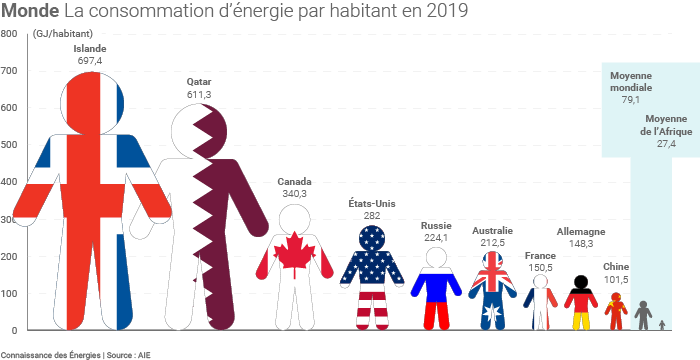The largest energy consumers per capita
Qatar, with its 2.6 million inhabitants, is the champion of energy consumption per capita, reaching 226,848 kWh. This impressive figure is explained by high air conditioning needs and an energy-intensive industrial sector. Iceland follows with a consumption of 167,422 kWh per capita, favored by its abundant hydroelectric and geothermal energy production. Singapore, a densely populated and highly industrialized city-state, consumes 160,277 kWh per capita. Trinidad and Tobago and Kuwait also show high consumption levels, with 106,747 kWh and 101,648 kWh respectively, largely due to their hydrocarbon industries. Norway, thanks to its vast hydroelectric resources, consumes 101,032 kWh per capita.
Other major consumers include Canada (99,916 kWh), Oman (92,605 kWh), the United States (77,028 kWh), and South Korea (66,698 kWh), reflecting their advanced economies and powerful industrial sectors.
Notable increases in consumption since 1965
Some countries have seen their energy consumption per capita explode since 1965. Qatar leads with an increase of 205,091 kWh, reflecting its rapid economic development. Singapore experienced a rise of 134,540 kWh due to its intense industrialization. Iceland also increased its consumption by 127,993 kWh thanks to the exploitation of its renewable energies. Oman (92,441 kWh) and Trinidad and Tobago (70,531 kWh) have seen their consumption grow due to their oil and gas industries. South Korea, Taiwan, and Norway have also experienced significant increases.
In percentage terms, Oman recorded the most marked relative growth with an increase of 56,370%. South Korea saw its consumption rise by 2,501%, reflecting its transformation into an advanced technological economy. Thailand, Vietnam, and China show significant increases of 1,852%, 1,648%, and 1,468% respectively, illustrating their rapid economic growth.

Reductions in consumption since 1965
Other countries have reduced their energy consumption per capita, often due to increased efforts in energy efficiency. Germany saw its consumption decrease by 998 kWh (-3%), while Denmark recorded a drop of 1,866 kWh (-5%). The Czech Republic reduced its consumption by 7,975 kWh (-17%). The United Kingdom observed a significant decrease of 14,210 kWh (-33%). Kuwait also experienced a substantial decline of 52,526 kWh (-34%). Luxembourg recorded the largest reduction, with a decrease of 69,417 kWh (-55%), thanks to improvements in energy efficiency and structural changes in its economy.
Consumption in France
In 2023, the French consumed an average of 37,164 kWh per capita, an increase of 9,197 kWh since 1965 (+33%). This rise is attributed to various factors such as industrialization, economic growth, and an increase in the standard of living.
Global comparison
In 2019, the average global energy consumption was 79.1 gigajoules (GJ) per capita. OECD developed countries consume overall twice as much energy per capita (165.6 GJ per capita in 2019). Iceland (697.4 GJ/capita) and Qatar (611.3 GJ/capita) stand out for their very high energy consumption, although Iceland relies heavily on geothermal energy.
The United States (282 GJ/capita), Russia (224.1 GJ/capita), Australia (212.5 GJ/capita), France (150.5 GJ/capita), Germany (148.3 GJ/capita), and China (101.5 GJ/capita) show high consumption levels, while Africa’s average remains low at 27.4 GJ/capita in 2019.
The two largest global consumers, China and the United States, account for 23.5% and 15.3% of global primary energy consumption, respectively. However, when adjusted for population, their individual consumption differs significantly.
With connaissancedesenergies.org


